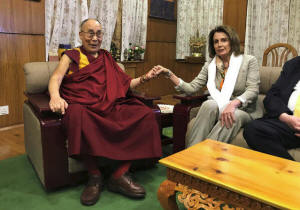|
U.S. lawmakers visit Dalai Lama,
highlight situation in Tibet
 Send a link to a friend
Send a link to a friend
 [May 09, 2017]
By Douglas Busvine [May 09, 2017]
By Douglas Busvine
DHARAMSALA, India (Reuters) - A U.S.
Congressional delegation visited the Dalai Lama at his headquarters in
India on Tuesday, seeking to draw world attention to human rights in
Tibet as President Donald Trump eyes warmer ties with China.
House Democratic Leader Nancy Pelosi flew with a bipartisan delegation
to the Himalayan hill town where the 81-year-old Buddhist leader is
based. The meeting is likely to upset China, which regards the Dalai
Lama as a separatist.
"As we visit His Holiness the Dalai Lama, our bipartisan delegation
comes in his spirit of faith and peace. We come on this visit to be
inspired by His Holiness and demonstrate our commitment to the Tibetan
people, to their faith, their culture and their language," Pelosi said.
The lawmakers' visit comes at a awkward time for Trump. Campaigning for
election, he had cast China as a trade adversary and currency
manipulator, but he now wants President Xi Jinping's support to restrain
nuclear-armed North Korea.
"This is my home," the Dalai Lama said holding Pelosi's hand after
welcoming the U.S. delegation to his timber-built hilltop residence. He
then corrected himself: "This is my second home. My real home - other
side."

He then reflected on his fate as a refugee, since fleeing from his
homeland in 1959.
"Here the last 58 years I am the longest guest of Indian government,"
the Dalai Lama said. "But, emotionally, some concern about deep inside
Tibet, and also in China proper there are 400 million Buddhists."
The Dalai Lama said he would be willing to visit China but this was not
possible while Beijing still considered him a "dangerous splittist."
POLICY ON TIBET
After Trump's election last November, the Dalai Lama said he was keen to
meet the incoming U.S. leader. It now looks unlikely the Nobel peace
laureate will get a White House invite - an honor accorded by recent
American presidents - anytime soon.
Secretary of State Rex Tillerson last week played down the role of human
rights in U.S. foreign policy, raising fears the Dalai Lama could lose
one of his last friends in the West.
Pelosi last visited the Dalai Lama in 2008, in the aftermath of a
Chinese crackdown on an uprising in Tibet that coincided with the
Beijing Olympics.

[to top of second column] |

U.S. House Minority Leader Nancy Pelosi meets Tibetan spiritual
leader the Dalai Lama at his headquarters in Dharamsala, India May
9, 2017. REUTERS/Douglas Busvine

The situation in the Tibet Autonomous Region has worsened since
then, according to experts and human rights activists, as
authorities crack down on dissent and pursue systematic policies to
assimilate Tibetans.
"The level of repression in Tibet has increased tremendously," said
Meenakshi Ganguly, South Asia director at Human Rights Watch.
Numbers crossing from Tibet into India and neighboring Nepal have
slowed to a trickle, she added, sapping the vitality of the Tibetan
emigre community in South Asia.
Reports continue to emerge from Tibet from time to time of isolated
acts of protest against Chinese rule.
A 16-year-old student, chanting "Tibet wants freedom" and "Let His
Holiness the Dalai Lama come back to Tibet", burned himself to death
on May 2, Radio Free Asia's Tibetan service has reported.
Representative Jim McGovern, a Democrat traveling with Pelosi, has
called for a new U.S. policy toward Tibet to safeguard the identity
of the Tibetan people and hold China accountable for human rights
abuses.
China took control of Tibet in 1950 in what it calls a "peaceful
liberation" and has piled pressure on foreign governments to shun
the Dalai Lama.
Most recently, Beijing denounced New Delhi for hosting the Dalai
Lama when he traveled to India's northeastern state of Arunachal
Pradesh - territory it claims as Southern Tibet - to give spiritual
teachings to his followers.
(Additional reporting by Abhishek Madhukar; Editing by Simon
Cameron-Moore)
[© 2017 Thomson Reuters. All rights
reserved.]
Copyright 2017 Reuters. All rights reserved. This material may not be published,
broadcast, rewritten or redistributed.
 |